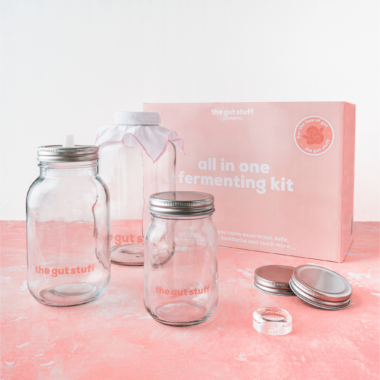
covid-19 and the gut
We hear its name round every corner, under muttered breaths and on every news programme but what does it have to do with your gut? Plenty as it turns out!
Going back to basics, we need to remember just how important our gut and its community of microbes are to our immune system.
Your immune system is found in every corner of your body, including 70% of it lining your gut. Your immune cells can also travel all over your body. It doesn’t work as one, like an organ would and *SPOILER ALERT* doesn’t need a ‘boost’. It relies on your gut microbes to educate it from an early age and can be downregulated by stress and impacted by diet.
Despite what you may hear, you have the power to support your immune system and gut microbes throughout your life, it isn’t rigid, and your gut plays a HUGE role. Look, it’s complex, ok? Find out more on your immune system here.
Your gut microbes can also interact with your lungs and the microbes that have set up residence there – say hello to the gut-lung-axis!
We know that our gut microbes may impact the severity of the illness we encounter, which is one of the many reasons for the quantity of research into Covid-19 and the symptom severity individuals encounter.
While the pandemic has been raging on, researchers have been busy looking at the connection with your gut microbes and Covid-19.
Even though the research is very much in its infancy, here are the headliners:
- The mix of gut microbes in Covid-19 patients compared to healthy non-infected individuals were significantly altered (for example, key bacteria to supporting immune response were underrepresented – think about the near empty festival stage because there aren’t enough fans).
- One study found that gastrointestinal symptoms were reported in 17.6% of infected individuals and tended to be more common in those with severe symptoms.
- How severe symptoms of Covid-19 are may be linked to the community of microbes living in your gut (we all need a strong community). Those with a less diverse mix tend to suffer more than those who have greater diversity amongst their microbial friends.
- Opportunistic gut pathogens may take more hold in Covid-19 infected individuals, meaning their microbial composition may change and they may be more likely to experience severe symptoms.
- There are theories that lack of microbial diversity amongst elderly and immunocompromised individuals may be contributing to worse Covid-19 outcomes in these individuals. Microbial diversity of gut microbes might also be used as a predictor for Covid-19 outcomes in the future.
- The increased sanitation and change in hygiene practices and reduced exposure to other microbes may also impact your gut microbiome in the long term and has the potential to reduce diversity of your gut microbes.
- Changes to how and where we work, weight, how we live, eat and exercise may also change the way our microbiome is shaped – this can be for better or worse. For example, those who have gained weight (and are now overweight) during the pandemic may be at greater risk of dysbiosis than those who are not. Researchers have also seen a trend in an increase in smoking and drinking, which will also influence your gut and lung and oral microbes – there are all connected!
- Last but not least, the huge mental load of the pandemic will have an impact on the gut-brain-axis. How this will affect long term gut health, we don’t know but the rates of depression and anxiety have increased since pre-pandemic times. Read more about the gut brain axis here.
What does the future hold?
Covid-19 and the various variants are still very much in their infancy, researchers are looking at the impact of probiotics (lactobacillus and Bifidobacteria) on treatments and for those who have had it, it may have impacted their gut microbiomes too… it’s still too early to tell but watch this space.
References
1. Burchill, E., Lymberopoulos, E., Menozzi, E., Budhdeo, S., McIlroy, J. R., Macnaughtan, J., & Sharma, N. (2021). The Unique Impact of COVID-19 on Human Gut Microbiome Research. Frontiers in medicine, 8, 652464. https://doi.org/10.3389/fmed.2021.652464
2. Cheung KS, Hung IFN, Chan PPY, Lung KC, Tso E, Liu R, et al. Gastrointestinal manifestations of SARS-CoV-2 infection and virus load in fecal samples from a Hong Kong cohort: systematic review and meta-analysis. Gastroenterology. (2020) 159:81–95. doi: 10.1053/j.gastro.2020.03.065
3. Singh RK, Chang H.-W, Yan D, Lee KM, Ucmak D, Wong K, et al. Influence of diet on the gut microbiome and implications for human health. J Transl Med.(2017) 15:73. doi: 10.1186/s12967-017-1175-y
4. Shen B, Yi X, Sun Y, Bi X, Du J, Zhang C, et al. Proteomic and metabolomic characterization of COVID-19 patient sera. Cell. (2020) 182:59–72.e15. doi: 10.1016/j.cell.2020.05.032
5. Sonnenburg JL, Sonnenburg ED. Vulnerability of the industrialized microbiota. Science. (2019) 366:eaaw9255. doi: 10.1126/science.aaw9255
6. Wakefield MA, Loken B, Hornik RC. Use of mass media campaigns to change health behaviour. Lancet. (2010) 376:1261–71. doi: 10.1016/S0140-6736(10)60809-4
7. Yeoh YK, Zuo T, Lui GC, et al. Gut microbiota composition reflects disease severity and dysfunctional immune responses in patients with COVID-19 Gut 2021;70:698-706




